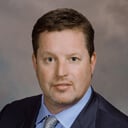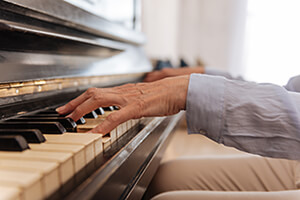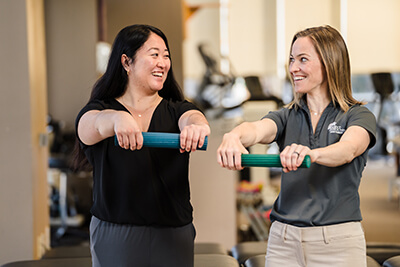Hand therapy for the musicians
Beat repetitive strain injury and get back in tune
Originally written on 6/9/2021 by: Rob McClellan, OTR/L, CHT. Updated 6/12/2023 to include new data and information. | 5 min. read
For many of us, our hands, wrists, arms, elbows and shoulders – or upper extremity – are an indispensable part of our everyday lives.
From laptop work to playing ball with the kids, from cooking a meal to swinging a golf club, upper extremity injuries and conditions will put a kink in your routine.
But for a performing artist, the overall health and well-being of their upper extremity is critical.
Consider an orchestra musician who plays the violin. The violin rests on the collarbone, cradled by the neck and supported by the left hand and shoulder. The right hand – all fingers placed correctly and grip strength considered – holds the bow. One stroke across the strings and bravo – a gorgeous sound erupts.
So what happens then if that shoulder is overly sore, or that right hand’s thumb or forefinger injured?
Cue the theme music from “Jaws,” folks.
Why are performing artists prone to injury?
Playing a musical instrument is emotionally, mentally and physically demanding.
In a musicians’ lifetime, up to 93% will experience musculoskeletal symptoms – pain, weakness, fatigue, aching and stiffness – when making music.
In short, musicians are at risk for career-ending injuries in the neck, shoulder, wrist and hand.
Musicians face unique challenges related to practice and rehearsal. Risk can occur when strenuous playing patterns are demanded in large segments of time, without rest or breaks.
Additional injury risk factors include:
- Inadequate physical conditioning
- Poor posture
- Abrupt increase in play time and patterns
- Poor techniques or a change in the instrument
Symptoms, whether intermittent or persistent, are seen most often when learning to play over the age of 50. And, in professional musicians, symptoms can present when increasing the complexity or time spent playing.
These symptoms are typically from repetitive strain injuries.
What are repetitive strain injuries?
A repetitive strain injury is an overuse injury. That is, you can hurt your body – namely your muscles, tendons or nerves – from repeating motion constantly.
For musicians, repetitive strain injuries are common and usually affect their upper extremity.
Common symptoms include:
- Pain
- Swelling
- Muscle cramping/burning
- Tremors/spasms
- Inability to control motion
- Numbness/tingling
- Stuck, catching or locking joints
- Inability to straighten fingers
Yet, repetitive strain injuries can be treated and prevented.
Self-care vs. professional therapy
Repetitive strain injury self-care does exist. From the RICE method – Rest, Ice, Compression, Elevation – to over-the-counter medical fixes, you may be saying, “Nah, I’ve got this on my own.”
However, self-care is a short-term fix that can lead to more harm than good. For the long- and short-term, the clear solution is a hand therapist.
Hand therapists are specially trained in the upper extremity and can determine the nature of your injury and work with you one-on-one.
After all, you wouldn’t want to jeopardize the long-term use of your playing “tools.”
Can hand therapy help performing artists?
Simply put, yes.
Hand therapy for musicians, or performing arts therapy, can help you heal properly.
And, hand therapists “arm” you (did you see what we did there?!) with the strategies necessary to not only heal from injury, but help you perform activities with less pain and chance for re-injury.
Our hand therapists have the skills needed to evaluate and identify abnormal sensation, poor posture and other causes of symptoms.
They identify risk factors and develop a rehabilitation program specific to your instrument, goals and play demand.
Throughout care, the hand therapist works with you to develop a return to normal play schedule that is timed incrementally and provides symptom management techniques during rest and after play.
We’ve come to the coda
As we come to our musical outro, we leave you with this: Hand therapists identify the root cause of injury, provide a whole-body approach to care and work in collaboration with music instructors to ensure continuity with proper technique and posture.
Education and early intervention is key, as early treatment leads to better outcomes.
So, don’t delay.
If you or a loved one are a musician and suffering from pain or discomfort while playing, request an appointment today and experience the power of hand therapy. Our certified hand therapists will help you get back to doing what you love – creating beautiful music.



